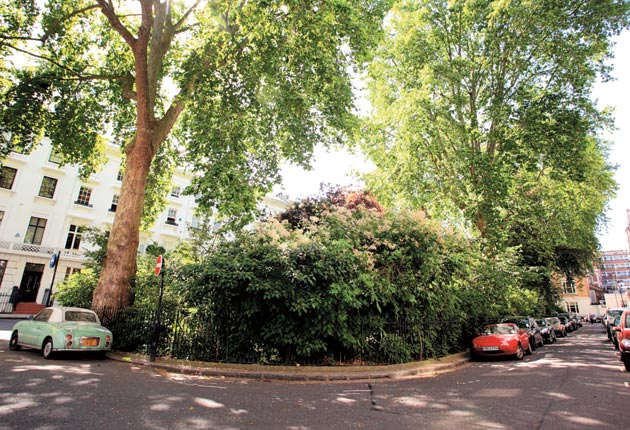Hedge-fund manager loses £150,000 legal bet on square

It must rank as one of the most expensive neighbourly disputes in history: a hedge fund manager and her lawyer husband face a bill of around £150,000 after failing in a legal bid to secure access to the exclusive garden square outside their west London home.
Mina Gerowin Herrmann, 58, and her husband, Jeffrey, 64, went to the High Court after they were locked out of the garden square, claiming that their lawyers had "assured" them that they would be allowed access prior to their buying the property in 2008.
The Herrmanns laid out more than £130,000 in legal fees, but the judge, Sir William Blackburne, threw out their case yesterday, calling their argument "ingenious but wrong". Their opponents' costs were put at around £40,000, and the Herrmanns, both US citizens, now face having to foot the majority of the bills.
The couple were said to have "seized the opportunity" of moving to Ovington Square in Kensington in 2008 because they had "long wanted" to live in central London.
The Herrmanns are said to have spent a great deal of time researching Victorian statutes and arcane rules relating to the city's garden squares, described by the judge as "one of London's glories".
Their property does not have a garden of its own, but the Herrmanns claimed that under a 160-year-old statute, they were entitled to a share of the nearby lozenge-shaped locked garden because of its proximity to their house. They pointed out that a portion of their property jutted out slightly from the front of the house next door, meaning that at least a few inches of it "front" on to the garden. But the judge ruled that "irrelevant", adding that exclusive access rights to the gardens only belong to residents whose homes "encompass" and front on to them.
The judge noted that "the existence of garden right adds considerably to the value of those properties which enjoy it".
Sir William added: "Situated typically in the middle of the square and fronted by terraced houses on each side of the square, the garden provides a haven of greenery and tranquillity amid the bustle of the neighbouring urban environment."
He added that, although the Kensington Improvement Act of 1851 did not specifically define what was meant by a "square", whatever its shape, it "must be of a kind which, with its attendant garden, the average man in the street would have no difficulty in recognising".
And he concluded his judgment, saying: "Since the front or side of No 37 does not face the square in the sense intended, it follows that the Herrmanns, as occupiers of that property, do not enjoy the garden right that they claim."
Sir William added that, if he had found for the Herrmanns, he would "risk upsetting" the status quo in many of London's garden squares, effectively granting access rights to residents of outlying streets who had not contributed to their maintenance.
In addition to their claim against the Royal Borough of Kensington & Chelsea, the couple also unsuccessfully sued the Ovington Square Garden Committee because it had refused to make a key to the garden available to them and they wanted damages for nuisance.
Mr and Mrs Herrmann moved to London from New York State, where they married in 2000. Mrs Herrmann is the MD of the investment bank Paulson Europe. Announcing their nuptials, The New York Times added that Mr Herrmann's previous marriage had ended in divorce.
Join our commenting forum
Join thought-provoking conversations, follow other Independent readers and see their replies
Comments
Bookmark popover
Removed from bookmarks